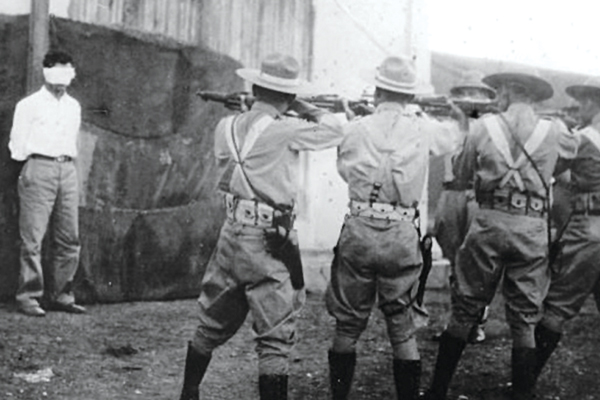Utah could be bringing back the firing squad
An accused anti-Batista insurgent is blindfolded and executed by firing squad, Cuba 1956
If you were looking to spice up the mundanity of contemporary capital punishment, the great state of Utah has you covered.
The Law Endorsement and Criminal Justice Interim Committee in Utah recently endorsed legislation that may bring back the firing squad as an optional method for criminal execution. The committee, which endorsed the bill with a 9-2 vote, proposed the legislation after a series of botched lethal injection executions that have caught negative attention in the press.
Moreover, Utah is having trouble getting access to the drug cocktail needed to carry out the injections and has turned to the firing squad as an alternative. The European company that formerly supplied the drug cocktail is now refusing to sell the drugs to the United States due to its opposition to capital punishment. This new proposal calls for the use of a firing squad if the state can’t obtain the drug 30 days before the convicted person is scheduled to be executed.
Apparently the logical solution to the overwhelming global opposition to capital punishment is to find more accessible alternatives to kill people.
Rather than questioning the archaic punishment that is the death penalty, certain states continue to support killing as a form of twisted justice for convicted criminals. Republican Senator Paul Ray, a member of the committee who voted in favour of the bill, called the firing squad “absolutely one of the most humane ways to execute someone.”
In an era when forensic evidence is proving that more and more prisoners on death row have been falsely convicted, any method of execution is inhumane.
According to The Innocence Project, there have already been approximately 321 post-conviction DNA exonerations in United States history, the vast majority of which are people of colour. That number is child’s play compared to a study conducted by legal experts and statisticians from Michigan and Pennsylvania, which found that upwards of four per cent of death row inmates are innocent.
On top of these horrifying statistics, capital punishment just doesn’t make sense from a financial point of view. Although the cost of carrying out capital punishment varies from state to state, the overall price tag for executing prisoners on death row is universally more expensive than keeping someone imprisoned for life. For example, Forbes magazine reports that the annual cost of the death penalty in the state of California is $137 million, while lifetime incarceration evens out to $11.5 million.
Coupled with the fact that many studies suggest the death penalty does not act as an effective deterrent to crime, it seems like capital punishment serves no real purpose except to satisfy some people’s ravenous bloodlust.
This problem is not limited to the US either, since the majority of Canadians share this mentality. Although capital punishment has not been officially practised in this country since 1962, a survey conducted in 2012 by Angus Reid Public Opinion in partnership with the Toronto Star found that 63 per cent of Canadians believe the death penalty is sometimes appropriate (a number that had grown from 48 per cent in 2004).
No matter where it is, capital punishment by any method is unethical and unjustified. Simply substituting one method for another does not change the fact that an eye for an eye leaves the whole world blind to common sense.





